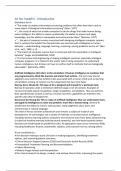AI for health. introductie
Definitions for AI
• “The study of complex information processing problems that often have their roots in
some aspect of biological information processing” (Marr, 1977)
• “...the study of ideas that enable computers to do the things that make human beings
seem intelligent: the ability to reason symbolically, the ability to acquire and apply
knowledge, and the ability to manipulate and communicate ideas” (Winston, 1977)
• “....the part of computer science concerned with designing intelligent computer systems,
that is, systems that exhibit the characteristics we associate with intelligence in human
behavior – understanding, language, learning, reasoning, solving problems and so on” (Barr
et al., vol 1, 1981, p. 3)
• “The branch of computer science that is concerned with the automation of intelligent
behavior” (Luger and Stubblefield, 1993)
• “It is the science and engineering of making intelligent machines, especially intelligent
computer programs. It is related to the similar task of using computers to understand
human intelligence, but AI does not have to confine itself to methods that are biologically
observable”. (McCarthy, 2007)
Artificial Intelligence (AI) refers to the simulation of human intelligence in machines that
are programmed to think like humans and mimic their actions. The term may also be
applied to any machine that exhibits traits associated with a human mind such as learning
and problem-solving. AI systems can be categorized into two main types:
Narrow AI (or Weak AI): This type of AI is designed and trained for a particular task.
Narrow AI operates under a limited pre-defined range or set of contexts. Examples of
narrow AI include speech recognition, image recognition, and chatbots. They can perform
their specified tasks at least as well as a human, but their capabilities are limited to the
specific tasks they're designed for.
General AI (or Strong AI): This is a type of artificial intelligence that can understand, learn,
and apply its intelligence to solve any problem, much like a human being. General AI
would have the ability to reason, solve puzzles, make judgments, plan, learn, and
communicate in natural language.
This level of AI has not been achieved yet and remains a subject of research and
development. AI technologies use a variety of methods to simulate human intelligence,
including machine learning (where computers are trained to learn from data), deep learning
(a subset of machine learning involving neural networks), and rule-based systems (where
decisions are made based on predefined rules). AI applications span across numerous fields
including healthcare, finance, automotive, robotics, and customer service, among others.
AI can contribute to...
AI for decision-making to assist clinicians in making diagnoses, identifying treatment
options, and improving patient outcomes
• Clinical Decision Support Systems (CDSS) and Electronic Health Records (EHR)
• Personalized Treatment Planning and Recommendations
• Patient Monitoring
• Medical Image Analysis and Interpretation
AI for clinical research to design, conduct, and analyze clinical trials, improving the speed
,and accuracy of clinical research
• Clinical Trial Design
• Clinical trial recruitment and patient matching
AI for drug discovery to help identify new drug targets, predict the efficacy of drug
candidates, and accelerate the drug discovery process.
Natural Language Processing (NLP) in Healthcare
• Natural language generation (NLG) for automated report writing
• Medical chatbots for patients
Medical Robotics
AI for Training
Health cycle: prevention —> diagnosis —> treatment —> follow-up
AI in homecare
AI in Mental health
• AIME started in 1985
• Every two year, since 2020 every year Europe/North America
• Connected to “Artificial Intelligence in MEDICINE” journal (AIIM journal (Elsevier))
• Focus: methods and techniques from computer science and artificial intelligence for
application in biomedicine and healthcare
• Reasoning (knowledge driven approaches)::
- Experts systems like Mycin in the 1980s (Diagnose bacterial infections of the blood and
recommend antibiotics)
- Ontologies (Disease ontology, ICD-9, MeSH, SNOMED, UMLS)
• Learning (recognising patterns in data):
- medical image recognition (lung) (CAD systems for mammography in the 1980s)
AI approaches
• Symbolic AI, Reasoning, Knowledge Representation
• Machine Learning
Tegenwoordig ook een combinatie
Symbolic AI: Reasoning
• Representing information about the world in a form that a computer can use.
• Representing knowledge about solving complex tasks.
Tasks like diagnosing, planning, having a dialog with human...
• Data —> information —> knowledge
...—-... —> SOS signal —> start rescue operation
• Knowledge Representation and Reasoning
= symbols & manipulation of symbols
• Several forms of knowledge representation (logic, rules, semantic nets, etc), and thus of
reasoning (eg. Probabilistic reasoning, temporal reasoning etc.)
Data-intelligence continuum
,Hybrid Intelligence Collaboration Human - AI
Ultimate goal is support for decision making by human clinicians at the point of care
• Improving the quality of care
• Improving efficiency of care
• Improving safety of care
AI systems should be motivated by the needs of the clinicians
Cognitive Science - Clinical Cognition- Medical AI
The science of cognition provides the foundation needed to drive AI-based decision-support
systems that can augment human behaviour.
Cognitive Science - Clinical Cognition - Medical AI
Hybrid Intelligence
, Hybrid: Human and AI
• Hybrid AI: Collaborative, Adaptive, Responsible, Explainable
• Examples:
• ICU discharge (VUmc, Amsterdam)
• Robot arm surgery (Erasmus MC Rotterdam)
• Personalised care in oncology
• Explanations are important —> Explainable AI
Artificial intelligence supports ICU physicians in patient discharge decision
• What is the right time to transfer a patient from the Intensive Care Unit to the nursing
ward?
• too soon is risky, if the patient deteriorates and has to go back to the ICU, the risk of death
is higher
• staying in the ICU for too long is also not a good idea: unpleasant for the patient, very
expensive and the bed cannot be used for another patient who may need it much more.





